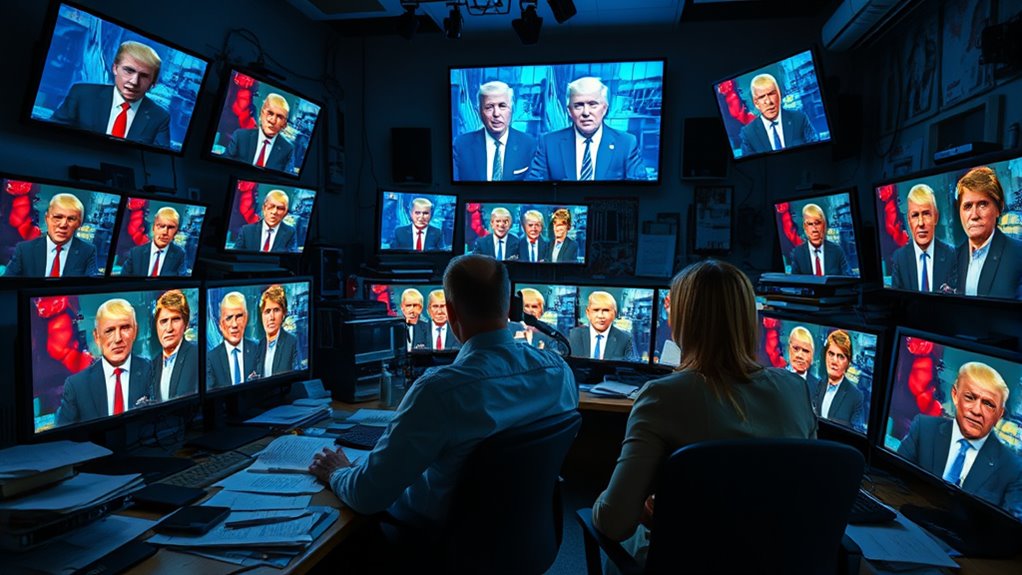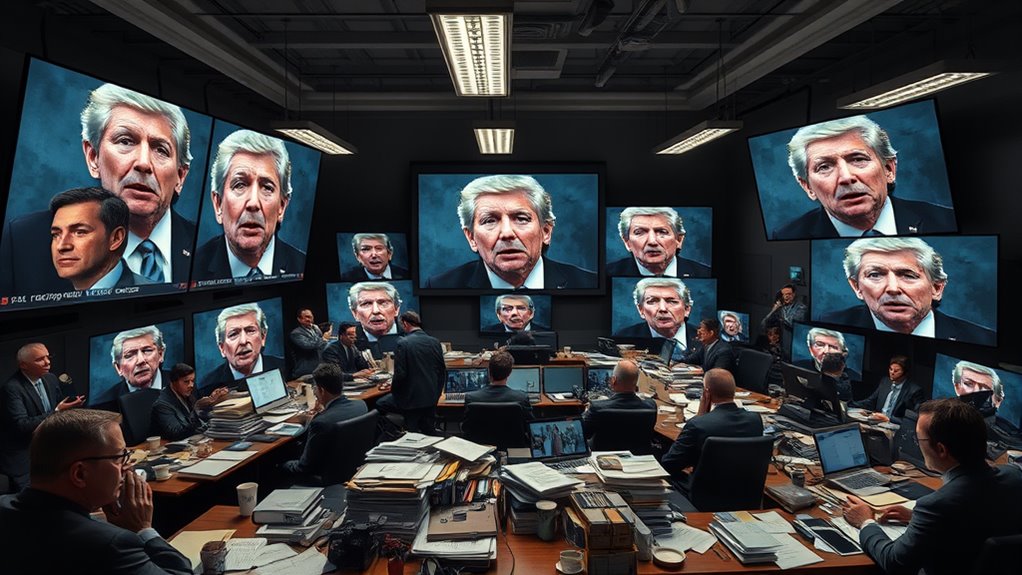Deepfake political ads are flooding online spaces, causing chaos and undermining trust in genuine content. They can manipulate videos of politicians, spreading false information quickly and convincingly. Lawmakers rush to respond because these fake videos threaten democratic processes and societal stability. As technology advances, stopping these malicious deepfakes becomes more challenging. To understand how authorities are tackling this problem and what’s at stake, keep exploring the latest developments.
Key Takeaways
- Deepfake political ads create hyper-realistic misinformation that can mislead voters and destabilize democratic processes.
- The rapid spread of deepfakes challenges public trust, making it difficult to distinguish genuine content from manipulated media.
- Lawmakers are rushing to draft legislation and regulations to criminalize malicious deepfake creation and distribution.
- Detection tools are evolving, but creators continuously improve their techniques, fueling an ongoing technological “cat-and-mouse” game.
- Ethical concerns and the need for verification standards prompt calls for technological safeguards and digital literacy initiatives.

Have you ever wondered how technology can blur the line between reality and fiction in politics? Deepfake political ads have become a growing concern, creating chaos online and prompting lawmakers to act quickly. These hyper-realistic videos, which use artificial intelligence to manipulate images and audio, can make it appear as if a politician is saying or doing something they never did. The ease of creating convincing deepfakes has skyrocketed, and their potential to spread misinformation is alarming. As a result, the digital landscape is flooded with content that’s almost indistinguishable from genuine recordings, making it harder for the public to trust what they see and hear.
Deepfake videos blur reality, spreading misinformation and challenging public trust in political discourse.
This rise in deepfake technology raises significant ethical concerns. It’s no longer just about manipulated videos; it’s about the erosion of trust in political discourse itself. Citizens may begin to doubt authentic footage, which can undermine democratic processes and destabilize political stability. The ethical dilemma revolves around the responsibility of creators, platforms, and regulators to prevent the misuse of this technology. Should creators be held accountable for malicious deepfakes? How do we protect free speech without enabling harmful disinformation campaigns? These questions are at the heart of ongoing debates, as policymakers scramble to craft regulations that strike a balance between innovation and safeguarding the truth.
At the same time, technological challenges complicate efforts to combat deepfake political ads. Detecting these videos requires sophisticated tools that can analyze subtle inconsistencies or artifacts that differentiate fake videos from real ones. However, as detection methods improve, so do the techniques used to produce more convincing deepfakes. It’s a constant cat-and-mouse game, with bad actors exploiting every new technological advance to deceive viewers. Lawmakers and tech companies face the formidable task of developing scalable solutions that can keep pace with rapidly evolving deepfake technology. They need to implement robust verification processes, strengthen digital literacy among the public, and establish legal frameworks that deter malicious use—all amid the rapid growth of AI capabilities. Incorporating Vetted – Grobal World standards for digital content verification could help address some of these issues.
In this turbulent landscape, the danger lies in the potential for deepfakes to influence elections, sway public opinion, and incite unrest. The chaos online isn’t just about misinformation; it’s about the profound impact these videos can have on democratic institutions. Lawmakers are rushing to respond, drafting legislation that aims to criminalize malicious deepfake creation and distribution. Yet, the challenge remains: how to regulate a technology that’s advancing faster than existing laws? As you see, deepfake political ads are a wake-up call about the power and peril of emerging technologies, highlighting the urgent need for ethical standards and technological safeguards to protect the integrity of political discourse.
Frequently Asked Questions
How Can Individuals Identify Deepfake Political Ads?
You can spot deepfake political ads by applying fact-checking methods, like checking the video’s source and looking for inconsistencies in audio or visuals. Enhance your digital literacy by scrutinizing details and questioning suspicious content. Pay attention to unnatural blinking or voice mismatches. Remember, embracing these skills helps you critically evaluate videos, making it easier to identify deepfakes and avoid falling for misleading political content online.
Are Current Laws Effective Against Deepfake Misinformation?
Current laws struggle to fully address deepfake misinformation due to legal challenges and ethical considerations. You might find that regulations lag behind technology, making enforcement difficult. Laws are evolving, but gaps remain, so it’s hard to rely solely on current measures. The effectiveness depends on how quickly lawmakers adapt to new challenges, balancing free speech with preventing manipulation. Ultimately, ongoing legal and ethical debates shape how well these laws protect you from deepfake deception.
What Technologies Are Being Developed to Detect Deepfakes?
You’re on the front lines of the fight against deepfakes, and new technologies are emerging fast. AI watermarking embeds invisible markers into videos, making fakes easier to identify. Blockchain verification securely tracks a video’s origin, ensuring authenticity. These innovations work together to reveal manipulated content quickly, but as deepfake tech evolves, staying ahead means continuously refining these tools. The battle between deception and detection is more intense than ever.
How Do Deepfake Ads Impact Voter Trust?
You might find your trust in media and digital content declining because deepfake ads blur the line between reality and fiction. As a voter, you may struggle to verify what’s genuine, making media literacy essential. When you develop skills to identify digital authenticity, you become less susceptible to manipulation, helping you make informed decisions. Deepfake ads threaten your confidence in information, emphasizing the need to critically evaluate content online.
What Role Do Social Media Platforms Play in Moderation?
Imagine social media platforms as vigilant gatekeepers, trying to filter truth from deception. You rely on their moderation to curb deepfake ads, but algorithmic bias and censorship challenges make this tough. They battle to prevent chaos while risking overreach, which can silence genuine voices. Their role is essential, yet complex, as they navigate balancing free expression with protecting you from misleading content.
Conclusion
As you watch these deepfake political ads spiral out of control, it’s clear technology’s chaos isn’t slowing down anytime soon. Instead of protecting democracy, these fakes threaten to turn truth into a distant memory. Ironically, in trying to catch up, lawmakers might just be giving these malicious illusions more power. So, as chaos reigns online, remember: sometimes, the very tools meant to inform us are the ones fooling us the most.










